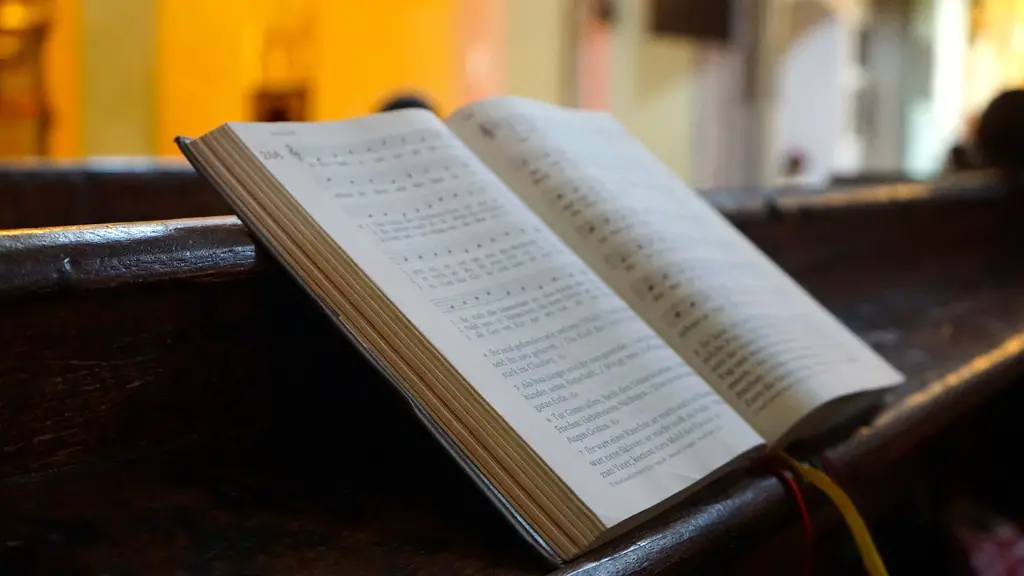Origin and Context
Maranatha is an Aramaic phrase which appears in some early Christian manuscripts. It is believed to have been an early form of Christian prayer, and has been cited as a greeting of sorts in a few scattered New Testament verses. The phrase is traditionally translated as “Come, Lord” or “Come, O Lord”, although there is some dispute over its meaning. It is sometimes used as an invocation at the beginning of Christian prayers, and it is believed to have been a shorthand version of a longer prayer uttered by early Christians, or an appeal to God to hasten the coming of the Kingdom of Heaven.
What Does Maranatha Mean?
The exact meaning of Maranatha is still debated among biblical scholars. Some argue that it is a plea for the Messiah to come bring an end to suffering and injustice. Others contend that it’s an invitation to an imminent time of renewal, while still others believe that it’s simply a prayer of hope and longing for a better future. Regardless of its exact meaning, the phrase has become associated with Christian faith and is often used in Christian worship and prayer.
Related Passages
The phrase Maranatha appears in four New Testament passages. In 1 Corinthians 16:22, it reads “Maranatha: Come, Lord!” In the Book of Revelation 22:17, the phrase is included as part of an invitation from Jesus: “The Spirit and the Bride say, ‘Come.’ And let the one who hears say, ‘Come.’ And let the one who is thirsty come; let the one who desires take the water of life without price.” In Jude 1:20-21, the author encourages believers to “build yourselves up in your most holy faith; pray in the Holy Spirit; keep yourselves in the love of God; wait for the mercy of our Lord Jesus Christ unto eternal life.” Finally, in Romans 16:20, Maranatha is included as part of a longer exhortation: “The God of peace will soon crush Satan under your feet. The grace of our Lord Jesus Christ be with you.”
Maranatha in Early Christianity
The phrase Maranatha was widely used by early Christians, who believed that it was an invocation for the Second Coming of Christ. Christian writers from the early centuries of Christianity strongly believed in the imminent arrival of the end times, and Maranatha was used as an appeal to God to hasten his coming.
Early Christian writers associated Maranatha with a plea for deliverance. As hatred and persecution of Christians grew in the Roman Empire, believers increasingly prayed for salvation, invoking the phrase Maranatha as a call for Christ’s imminent return. Today, Christians continue to pray for the Second Coming of Christ and view Maranatha as a reminder of their hope for Christ to return and bring an end to all suffering and injustice.
Theological Significance
Maranatha has particular theological significance for Christians, as it offers a reminder of the hope that comes with salvation and new life in Christ. Christian theology encourages believers to hope for an eternity with God, and Maranatha serves as a reminder of that future. For the early Christians, Maranatha provided hope and comfort in times of hardship and suffering, and for believers today, Maranatha serves as a reminder of the believer’s ultimate destiny and a call to live righteously in light of that hope.
Use in Worship
Many Christian denominations use the phrase Maranatha as part of their worship services. It is often incorporated into traditional prayers and is used as a starting point for sermons. In many churches, Maranatha is recited at the beginning of the service in an invocation, reminding the worshippers of their ultimate hope and invoking God’s presence and grace.
Cultural Significance
The phrase Maranatha has come to be associated with a sense of anticipation and hope in Christian cultural circles. Maranatha is often used as part of Christian song lyrics, and is included in many paintings and other works of art to represent the believer’s hope for Christ’s imminent return. It is also incorporated into jewelry, tattoos, and other pieces of Christian apparel, serving to remind the wearer of their hope for redemption and eternal life.
Justice and Mercy
Maranatha reminds believers of the importance of justice and mercy in Christian life. Many Christians believe that the phrase invokes God’s mercy and justice, and that it is a prayer for humankind to receive God’s grace and blessings when Christ returns to bring his kingdom in its fullness. Maranatha serves as a reminder to Christians that justice and mercy should be upheld on a daily basis, and that there is hope in the coming of Christ and the new life he will bring.
Living in Light of Maranatha
Maranatha encourages believers to live in a manner that reflects the hope they have for their ultimate redemption in Christ. As the phrase reminds believers of the hope of an eternal future, it also encourages them to live in such a way that reflects that hope. Believers should strive to act in a way that displays God’s mercy and justice, and should remember that their ultimate hope lies in the coming of Christ and his judgment.
Conclusion of Christ’s Return
Maranatha serves as a reminder to believers that Christ will ultimately return to bring the world justice and righteous judgment. The phrase provides hope to believers, and reminds them of their ultimate destiny in God. Maranatha remains an oft-invoked phrase in Christian culture, still invoked centuries after it first appeared in early Christian manuscripts. It serves as a reminder of the hope that comes with the ultimate redemption and judgment of Christ.


